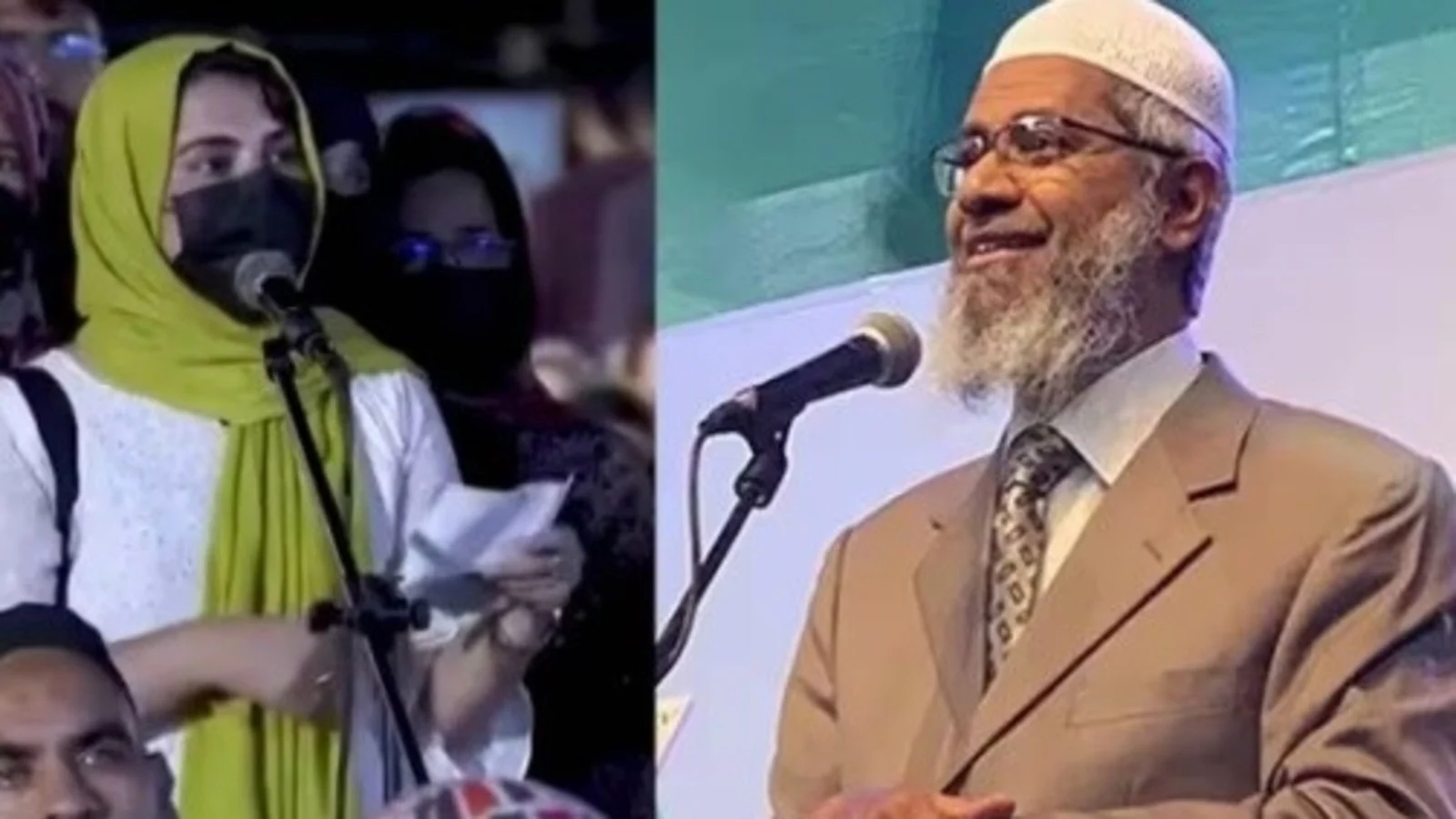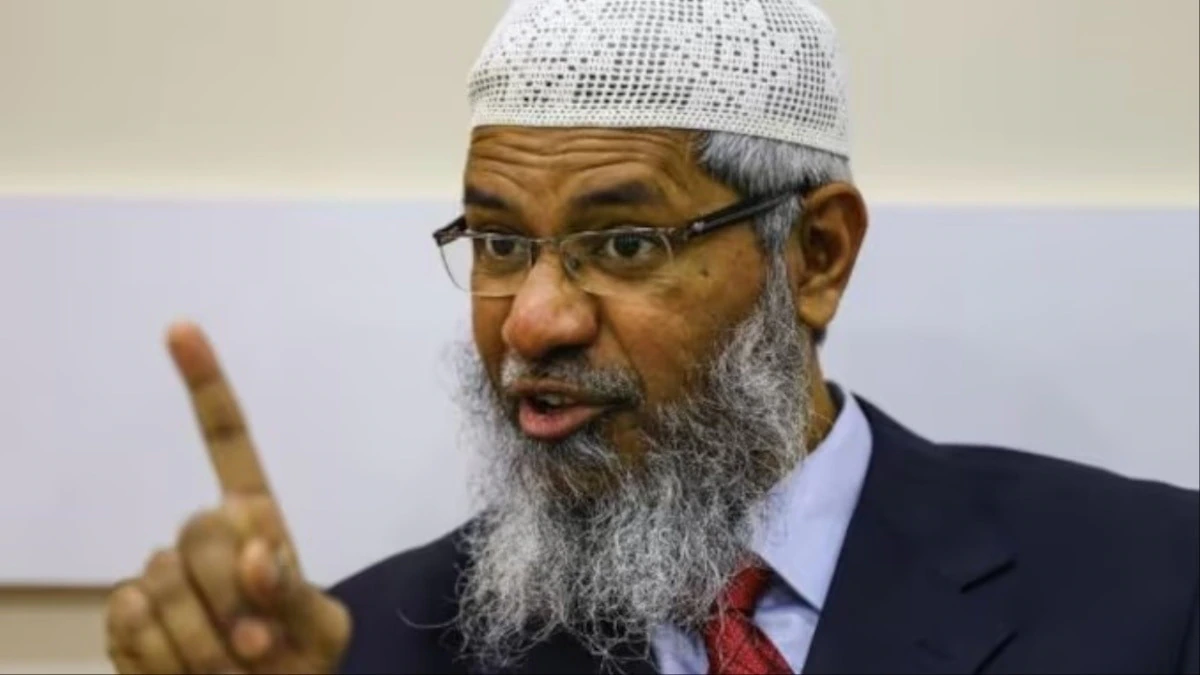.webp)
Uzma Khatoon
Zakir Naik, a controversial Islamic preacher, has made numerous statements about women that have sparked debates within and outside the Muslim community. His recent visit to Pakistan caused significant controversy due to his remarks about unmarried women. During a speech at the Governor House in Karachi, Naik claimed that unmarried women could not be respected and suggested they have only two options: marry a man who already has a wife or become "bazaari aurat" (public property). These statements sparked widespread outrage in Pakistan, with many public figures condemning his remarks as regressive and sexist.
Naik's visit was further marred by additional controversies, including his refusal to present awards to orphaned girls and his demand for VIP treatment regarding luggage allowance. The incident has led to debates about religious interpretation, women's rights, and the appropriateness of hosting controversial figures as state guests in Pakistan.
This episode highlights the ongoing tensions between conservative religious views and progressive attitudes toward women's rights and social issues in the country.
It also underscores the challenges faced by Muslim women, particularly in India, where they often struggle with issues like conservative societal norms, limited access to education, and economic disadvantages. This article provides a feminist critique of Zakir Naik's controversial views on women from an Islamic perspective. The article concludes by calling for constructive dialogue within the Muslim community to challenge regressive interpretations and promote a more inclusive understanding of Islam that upholds women's rights by Quranic principles.
Marriage and Objectification of Women
Zakir Naik’s assertion that unmarried women should marry as soon as possible to avoid becoming "public property" or "prostitutes" is a clear example of how patriarchal interpretations of Islam can distort the faith's fundamental principles. By reducing women’s worth to their marital status, Naik perpetuates a harmful objectification of women.
slamic feminists like Amina Wadud argue that such interpretations are not only inaccurate but also contrary to the Quran’s message. Wadud emphasizes that the Quran grants women autonomy and dignity, regardless of marital status. The verse, "And among His signs is this: that He created for you mates from among yourselves, that you may dwell in tranquility with them, and He has put love and mercy between your (hearts)" (Quran 30:21), does not imply that women are incomplete or vulnerable without marriage. Instead, it highlights the mutual respect and compassion that should define relationships.
Polygamy, which Naik presents as a solution for unmarried women, is another issue where patriarchal norms have distorted Islamic principles. While the Quran allows polygamy in limited circumstances, it also emphasizes justice, saying, "But if you fear that you will not be just, then [marry only] one" (Quran 4:3). Islamic feminists like Siti Musdah Mulia advocate for a more egalitarian interpretation, stressing that polygamy is a conditional practice, not a blanket solution for women’s issues. Mulia contends that modern Muslim societies should focus on ensuring women’s rights and their autonomy to make informed choices, rather than pressuring them into marriages that may not be in their best interest.
 Zakir Naik arguing with a Baloch woman in Pakistan
Zakir Naik arguing with a Baloch woman in Pakistan
IModesty, Dress, and Victim-Blaming
Naik’s remarks about women’s dress, where he suggests that immodest clothing makes women partly responsible for being raped, reflect a dangerous form of victim-blaming that has no place in Islamic teachings. The concept of modesty (haya) in Islam is indeed important, but it is a mutual obligation for both men and women. The Quran instructs, "Tell the believing men to lower their gaze and guard their private parts... And tell the believing women to lower their gaze and guard their private parts" (Quran 24:30-31). This verse highlights the mutual responsibility for maintaining modesty and does not support placing the burden of morality solely on women.
Islamic feminists strongly critique the notion that women’s attire is responsible for men’s actions. Islamic feminists argue that this kind of victim-blaming perpetuates patriarchal structures by deflecting responsibility away from perpetrators of sexual violence and placing it on women. The Quran promotes personal accountability and justice, and it is unjust to hold women responsible for the violence inflicted upon them. Instead, the focus should be on addressing the root causes of sexual violence, including toxic masculinity and societal structures that enable it. In India, Every fourth rape victim across the country in 2018 was a minor, while more than 50 percent of them fell in the age category of 18 to 30 years, according to the latest National Crime Records Bureau (NCRB) data. In almost 94 percent of the cases, the offenders were known to the victims - family members, friends, live-in partners, employers, or others, the data showed.
By framing women’s dress as a potential cause of rape, Naik reinforces the patriarchal idea that women must be controlled or "protected" from male desire, rather than holding men accountable for their actions. This view not only diminishes women’s autonomy but also undermines the Quran’s emphasis on justice and personal responsibility.
Educational Restrictions and Gender Segregation
Naik’s suggestion that girls should not attend schools where they might “lose their virginity” is another harmful assertion that limits women’s access to education. This statement reflects a deeply patriarchal mindset that views women as inherently vulnerable and in need of constant protection. However, Islamic teachings emphasize the importance of education for both men and women.
The Quran encourages the pursuit of knowledge, saying, “Are those who know equal to those who do not know?” (Quran 39:9). The Prophet Muhammad also stated, “Seeking knowledge is obligatory upon every Muslim” (Sunan Ibn Majah), without distinguishing between men and women. Siti Musdah Mulia, a prominent advocate for women’s education in Islam, argues that denying women access to education based on fears of immorality is not only regressive but also contrary to Islamic principles of intellectual and spiritual growth. Women, like men, are full participants in society and must have equal opportunities to acquire knowledge.
Naik’s stance reflects a broader pattern of patriarchal control over women’s bodies and lives, which Islamic feminists reject. By framing women as morally weak or in need of protection from the potential dangers of education, Naik’s view undermines women’s autonomy and their right to make informed decisions about their own lives. In contrast, Islam encourages intellectual and moral empowerment for all individuals, regardless of gender.
Criticism of Western Women and Feminism
Zakir Naik’s critique of Western societies for “selling their daughters and mothers under the guise of women’s liberation” represents a dismissive attitude toward the legitimate struggles for women’s rights. While it is true that some aspects of Western feminism may conflict with Islamic values, such as those related to sexual liberation, this critique oversimplifies the complex fight for gender equality that transcends cultural boundaries but Equality by birth, equality under the law, the right to freedom, and the presumption of innocence until proven guilty. These elements are considered inherent to both Islamic and Western feminist thought.
 Zakir Naik speaking at a public event in Pakistan
Zakir Naik speaking at a public event in PakistanIslamic feminists recognize that women’s liberation is not about commodification, but about achieving equal rights, autonomy, and justice. Muslim women argue that Islamic feminism is not opposed to feminism as a whole but seeks to balance the principles of justice and equality with Islamic values. Issues like equal pay, reproductive rights, and protection from domestic violence are universal concerns that affect women globally, including in Muslim societies.
Instead of dismissing feminism as a Western imposition, Islamic feminists advocate for a reinterpretation of Islamic teachings that center around justice for women. They emphasize that true liberation comes from within the framework of justice that Islam promotes, where women are seen as equal partners in society, free to pursue their intellectual, spiritual, and social potential.
Broader Societal Impacts and Gender Segregation
Naik’s refusal to interact with orphaned girls at an event, citing religious reasons, is an example of how rigid interpretations of gender segregation can marginalize women in public life. Islamic feminists argue for a more nuanced understanding of gender interactions that respects boundaries but does not exclude women from social, religious, or political participation. The influence of conservative religious interpretations on Muslim women's rights is restrictive. It highlights that traditional religious teachers and scholars often present Islam in a way that considers women inferior to men. This conservative interpretation limits women's rights and freedoms, such as education, employment, and social participation. The practice of triple talaq is cited as an example of how these interpretations negatively impact women's social status. Despite the Quran granting various rights to women, these are often overshadowed by conservative societal norms that restrict their implementation.
The Prophet Muhammad interacted with women publicly, including those in vulnerable positions, such as orphans and widows. His actions serve as a model for inclusive gender relations that do not treat women as untouchable or inferior. Excluding women from public spaces or events, as Naik’s actions suggest, perpetuates a culture of exclusion and reinforces patriarchal structures that limit women’s participation in society.
The societal implications of such rigid interpretations are profound. By marginalizing women and limiting their access to public life, Naik’s views contribute to the broader disenfranchisement of women in Muslim communities. Islamic feminists argue that gender segregation, when practiced rigidly, can undermine women’s rights to education, employment, and political participation, all of which are necessary for a just and balanced society.
Promoting Constructive Dialogue Within the Muslim Community
It is crucial to recognize that the Muslim community is not monolithic. Islamic feminists like Amina Wadud and Siti Musdah Mulia advocate for constructive dialogue within the community to challenge regressive interpretations and promote a more inclusive understanding of Islam. They emphasize that Islam’s message of justice, compassion, and equality should be at the forefront of discussions about gender relations.
Naik’s statements reflect a narrow, patriarchal view that fails to account for the diverse experiences of Muslim women and the Quran’s message of gender justice. By encouraging open debate and dialogue, Islamic feminists aim to reclaim Islam’s egalitarian ethos and ensure that women’s rights are upheld by the Quran’s principles of justice.
Zakir Naik’s controversial statements about women reflect a patriarchal interpretation of Islam that Islamic feminists vehemently challenge. Islam offers a far more egalitarian and just framework for understanding gender relations. The Quran’s emphasis on equality, justice, and personal accountability stands in stark contrast to the restrictive views Naik promotes.
ALSO READ: Zakir Naik’s confidence tinged with arrogance saw preacher’s fall in Pakistan
By fostering open dialogue and encouraging a re-examination of Islamic teachings, we can work toward a more inclusive and just understanding of women’s rights in Islam—one that empowers women as full participants in society and honours their autonomy, dignity, and intellectual contributions.
Dr. Uzma Khatoon has taught at the Aligarh Muslim University
